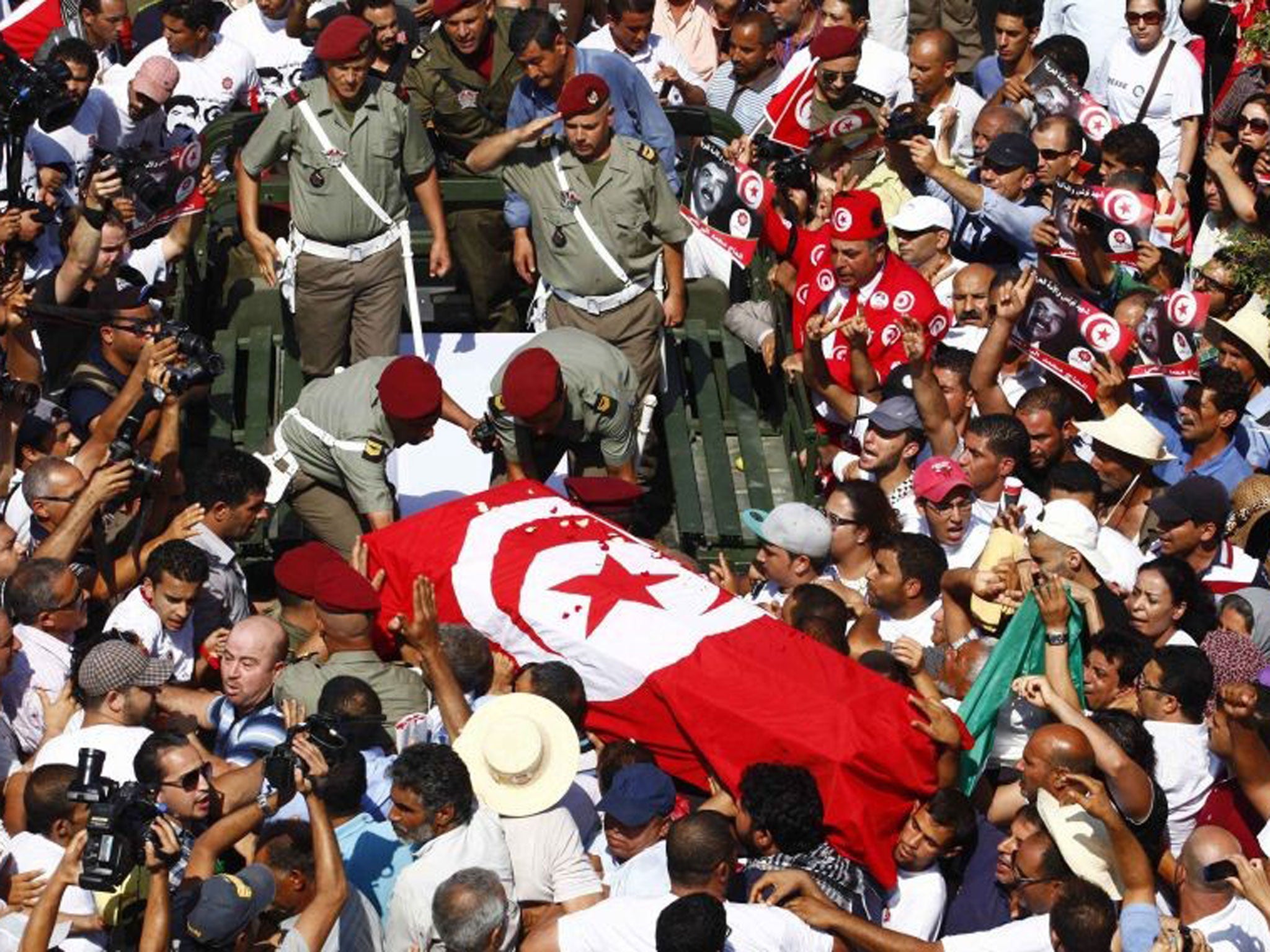Car bomb detonated and one shot dead ahead of funeral for murdered MP in Tunisia

Your support helps us to tell the story
From reproductive rights to climate change to Big Tech, The Independent is on the ground when the story is developing. Whether it's investigating the financials of Elon Musk's pro-Trump PAC or producing our latest documentary, 'The A Word', which shines a light on the American women fighting for reproductive rights, we know how important it is to parse out the facts from the messaging.
At such a critical moment in US history, we need reporters on the ground. Your donation allows us to keep sending journalists to speak to both sides of the story.
The Independent is trusted by Americans across the entire political spectrum. And unlike many other quality news outlets, we choose not to lock Americans out of our reporting and analysis with paywalls. We believe quality journalism should be available to everyone, paid for by those who can afford it.
Your support makes all the difference.A man was killed and a car bomb detonated in the Tunisian capital of Tunis on Saturday during violent protests ahead of the funeral of an assassinated politician.
The death of secular opposition Movement of the People leader Mohamed Brahmi, gunned down outside his Tunis home on Thursday, has exacerbated tensions in the North African country and heightened the pressure on its Islamist rulers.
Witnesses said one man was killed early on Saturday in an overnight anti-government protest in the southern city of Gafsa. A bomb planted in a police car also exploded in area but caused no casualties, a spokesman at the Interior Ministry said, whilst violence erupted across several other cities.
The funeral, due to start at 9am GMT, saw hundreds of people gather outside Brahmi's home in the suburb of Gazella, brandishing pictures of him and chanting anti-government slogans. Hundreds of police were deployed in anticipation of violence.
The funeral procession was then set to continue down the main street of the capital, near the Interior Ministry.
Brahmi's family has accused the main Islamist Ennahda party of being responsible for his death. But it's leader, Rached Ghannouchi, denounced the assassination as an attack on democracy.
On Friday evening 42 opposition members announced their resignation from the 217-seat Constituent Assembly, in protest against the killing of the 58-year-old.
Khamis Kssila of the Nida Touns party said the departing members would stage a sit-in to demand the dissolution of the assembly and formation of a national salvation government - ideas rejected by Prime Minister Ali Larayedh.
The Islamist controlled assembly is in charge of drafting a new constitution for the nation of 11 million people.
Several thousand took to the streets of Tunis on Friday to defend the government from popular demands that it resign over the assassination.
Interior Minister Lotfi Ben Jeddou drew a direct link between the latest killing and the assassination of the Popular Front's leader, Chokri Belaid, on 6 Feb, which also stoked violent protests.
Aiming suspicion at a hardline Islamist, the minister said the same gun had been used in Thursday's killing as in the Belaid assassination.
"The same 9mm automatic weapon that killed Belaid also killed Brahmi," he told a news conference, naming the main suspect as Salafist Boubacar Hakim, already being sought on suspicion of smuggling weapons from Libya.
Authorities have identified 14 Salafists suspected of involvement in Belaid's assassination, and most were believed to be members of the local hardline Islamist group Ansar al-Sharia, he said.
Tunisia's political transition since the revolt that toppled Ben Ali has been relatively peaceful, with the moderate Islamist Ennahda party sharing power with smaller secular parties.
But the government has struggled to revive the economy and has come under fire from secularists who accuse it of failing to curb the activities of Salafi Islamists.
Divisions between Islamists and their secular opponents have widened since President Zine al-Abidine Ben Ali was overthrown in 2011 during the first of the Arab Spring revolutions that also felled leaders in Egypt, Libya and Yemen.
Join our commenting forum
Join thought-provoking conversations, follow other Independent readers and see their replies
Comments